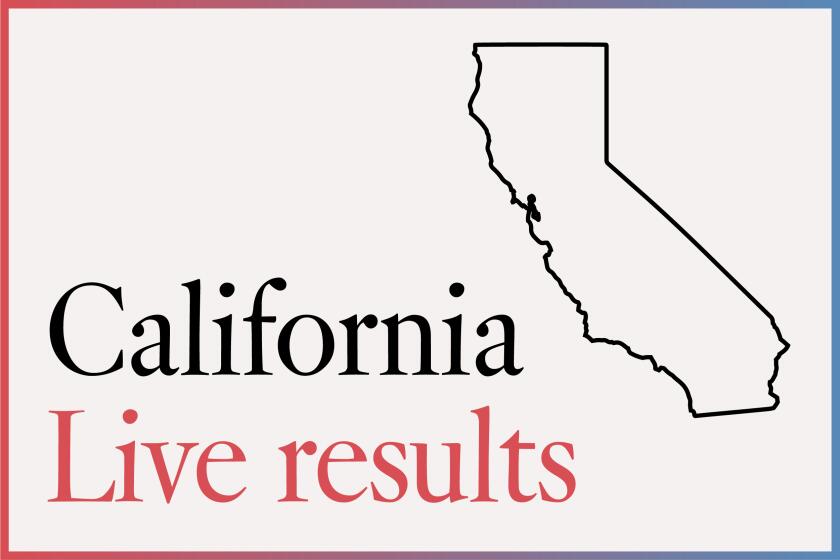California voters reject big changes to landmark property tax measure Prop. 13

- Share via
SACRAMENTO — A four-decade quest to downsize Proposition 13, California’s famed limit on property taxes, has come up short after supporters failed to convince a new generation of voters that businesses should pay more to help fund schools and local services.
Defenders of the landmark 1978 tax-cutting initiative say that the defeat of this year’s proposal, Proposition 15, should serve as a warning to liberal activists and labor unions.
“Like it or not, Prop. 13 has almost mythical powers against those who would assail it,” Jon Coupal, president of the Howard Jarvis Taxpayers Assn., wrote last week.
On Tuesday, the Associated Press projected Proposition 15 had been defeated with 48% of votes in support and 52% opposed — more than 15 million votes have been tallied so far. Final results aren’t expected until the end of the month.
More than $139 million was spent by supporters and opponents combined on the Proposition 15 campaign. Its backers spent years crafting their plan to strip high-value business properties from the protections provided by Proposition 13, arguing that the long-standing law has allowed powerful corporations to avoid paying property taxes they can easily afford. Had they prevailed, independent analysts said, the higher business property taxes could have brought in as much as $11.5 billion a year in new funds for public schools and local governments.
The California Teachers Assn., one of the state’s most politically powerful labor unions, contributed more than $20 million to the campaign in favor of Proposition 15.
“We came very close, but we demonstrated the power of democracy in action. We demonstrated the difference we can make for ourselves and the next generation. That alone is a victory,” E. Toby Boyd, the union’s president, said in a statement.
Supporters prevailed in Los Angeles, the Bay Area and a handful of other coastal counties, according to unofficial returns. But Proposition 15 ran into strong opposition just about everywhere else, resoundingly rejected in the Central Valley, Inland Empire and Orange and San Diego counties.
The tally of support was close to that found in a poll last month by the UC Berkeley Institute of Governmental Studies, in which 49% of likely voters said they would vote for Proposition 15. The business-funded campaign opposed to Proposition 15 said its own private polling found that voters who were undecided toward the end broke sharply against the measure.
Where Proposition 13 sets the value of a property by its purchase price and caps the annual tax at 1% of the value, Proposition 15 would have generated new tax revenue by allowing more frequent valuations of commercial and industrial property holdings worth $3 million or more. Some lower-valued properties would have also been swept into the system because their owners have large portfolios of property across California.
“California voters understood the very real threat Proposition 15 presented to small businesses, farmers and consumers,” Allan Zaremberg, president of the California Chamber of Commerce, said in a written statement. “Voters in California smartly recognized that enacting the largest tax hike in California history would have been devastating to jobs, our economy and California’s future competitiveness.”
While the homeowner tax protections of Proposition 13 have remained popular over the last four decades, liberal interest groups and labor unions believed few voters realized that the low-tax rules also applied to multimillion-dollar corporations. Numerous studies revealed that many of these companies, many headquartered in Southern California and the Bay Area, operate in facilities where land values have changed very little since the 1970s — even as new businesses and homeowners alike pay taxes on property assessed more closely to market value.
Larry Grisolano, a Democratic campaign consultant to the effort supporting Proposition 15, said the big business donors to the opposition campaign — which spent some $72 million to defeat the initiative — were never mentioned in the advertising blitz.
“There was not one element of the ‘no’ campaign that said we should keep helping these big corporations,” he said. “That ought to tell you something.”
Instead, business groups focused on Proposition 15’s potential impact on small businesses. Their advertising campaign hammered away at the fact that business owners who lease their locations are often required to pay some, or all, of the building owner’s property taxes.
And while Proposition 15 was explicit in its protection of residential property tax rules, some of its opponents ominously warned that it was the first step toward a complete overhaul or outright repeal of Proposition 13.
Too few voters were swayed by the promise of new, substantial tax revenue. About 40% of the revenue would have been sent to K-12 schools and community colleges, while the remaining 60% would go to counties, cities and special districts for services such as law enforcement and fire suppression. The Berkeley poll found that less than a majority of middle-aged voters and those who described themselves as moderates or conservatives believed the new tax revenue was needed.
Though other tax increases have been approved by California voters in recent years, the uncertainty of the current economy may have presented too strong a head wind for Proposition 15 supporters. The pandemic, Grisolano said, created “cross-pressures” for voters who are worried about schools and public health but fearful of a staggering economy.
“People have a very strong sense of uncertainty,” he said. “Those insecurities make it very difficult for them to take a risk on a change.”
Voters will likely consider a proposal in 2020 to limit Proposition 13’s tax limits to homeowners, boosting assessments on commercial properties and using much of the money on K-12 schools.
Supporters of changing the rules for corporate property taxes are unlikely to see the relatively narrow defeat of Proposition 15 as the end of the effort. The proposal had the support of Gov. Gavin Newsom, who has also suggested broader reviews of California’s tax structure in an effort to limit some of the lingering effects of Proposition 13 — most notably, how the cut in property taxes made government services more dependent on income and sales taxes, both susceptible to rapid up-and-down changes.
Boyd, whose union of more than 300,000 educators has led a number of efforts to increase K-12 school funding, said the pandemic-induced recession has only amplified the needs of students.
“The fight for much-needed funding for equitable resources continues as our schools and communities face billions in devastating budget cuts,” he said in a statement.
Any new effort would likely again be contested by business groups, who argue that California is already one of the most expensive states in the country for entrepreneurs and corporate operations.
Whether any future effort would more directly tackle the legacy of Proposition 13 is unclear. Neither side in the Proposition 15 campaign chose to invoke the well-known proposition, and public polling suggests voters generally think of it in positive terms.
Similar polls have also found support for rethinking the tax law’s benefits to business — an embrace of an idea that the election results suggest may be hard to turn into reality.
More to Read
Sign up for Essential California
The most important California stories and recommendations in your inbox every morning.
You may occasionally receive promotional content from the Los Angeles Times.












